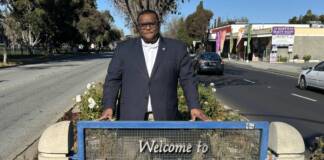by Diane Bukowski
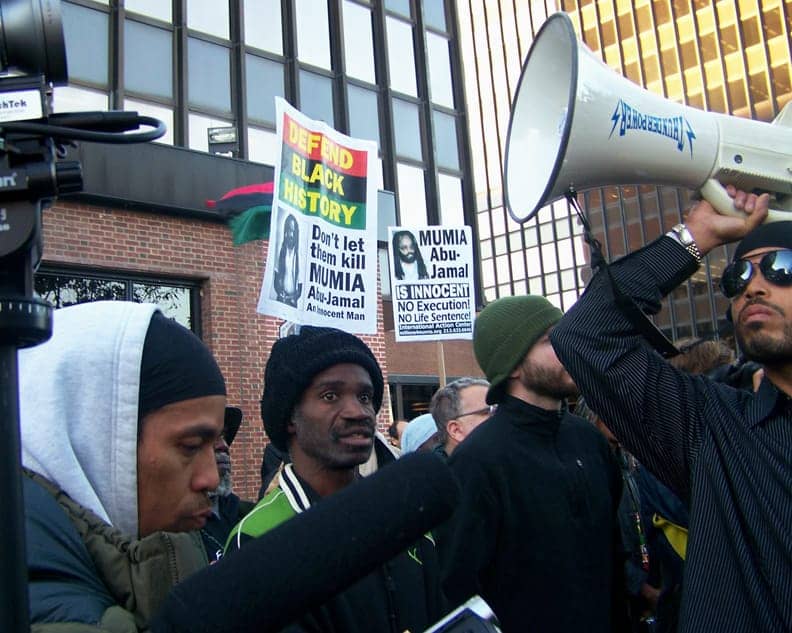
In January 2009, the U.S. Supreme Court ordered the three-judge appeals panel hearing Abu-Jamal’s case Nov. 9 to determine whether it should re-instate his death penalty. In 2008, the panel upheld a lower court judge’s 2001 decision overturning the sentence due to flawed jury instructions.
“We shouldn’t even be talking about whether Mumia gets the death penalty or a life sentence,” New York City Councilman Charles Barron, a member of the Freedom Party, said before the hearing.
“People all over the world are calling for his freedom. What happened to him can happen to all of us. As Angela Davis said, ‘If they come for me in the morning, they will come for you at night.’ We all have the right to freedom, to self-determination, to be able to rebel against a racist system without being framed.”
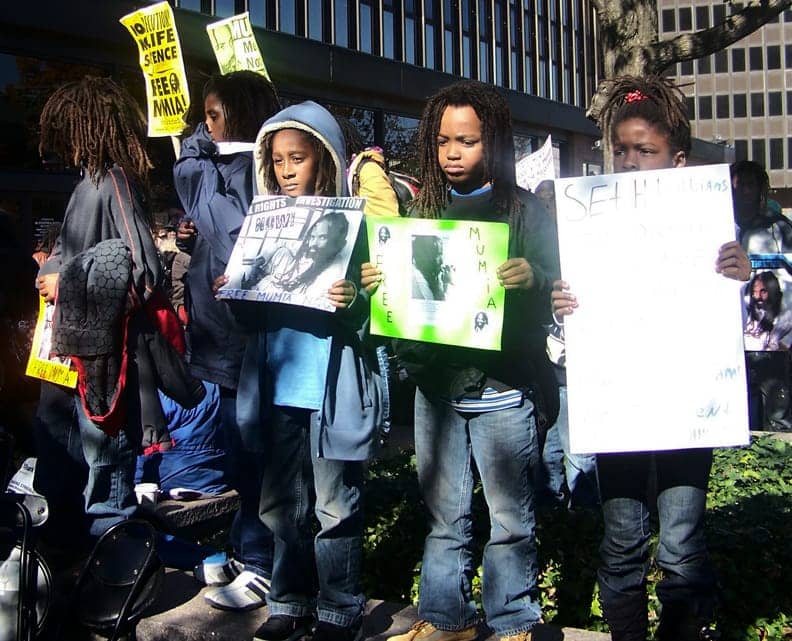
He has been on death row for 29 years, where he has pursued his vocation relentlessly, reporting on prisons in the U.S., writing on national and international affairs, and authoring six books. Abu-Jamal began his career at the age of 14 as a reporter for the national Black Panther newspaper.
On Nov. 9, he remained in the state prison at Waynesburg, Pennsylvania, where he is housed on death row. But his words were conveyed earlier by phone from death row Oct. 23 and heard by thousands at an Oakland, California, rally for justice for Oscar Grant. Grant, a young father, was shot in the back and killed by transit police officer Johannes Mehserle in 2009, as he lay prone on a train platform.
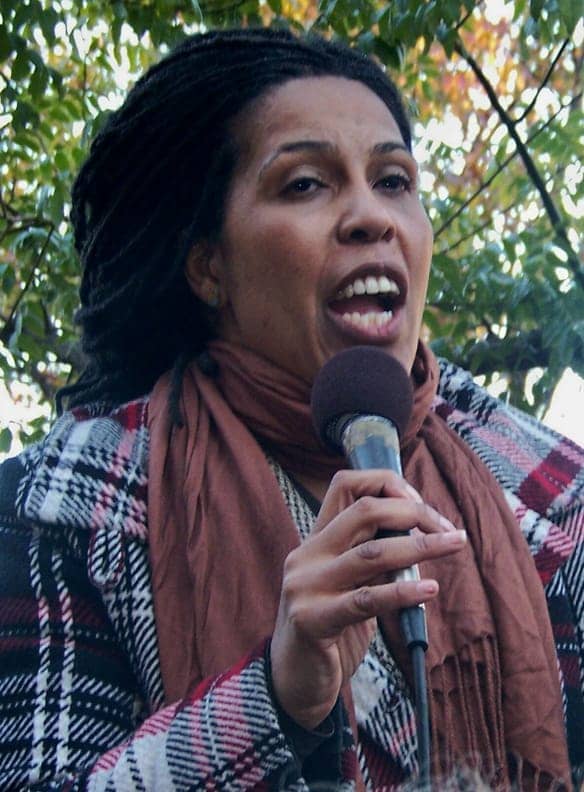
French government, union and anti-death penalty officials joined members of the German Network to Free Mumia and noted leaders from across the U.S. to attend Abu-Jamal’s hearing in Philadelphia.
Countries who are members of the European Union are required to repudiate the death penalty.
“No human being should be able to decide who has to die, especially if there was no fair trial beforehand,” Clothilde Le Coz, a French citizen from Reporters without Borders, said. “In France and throughout Europe, it is the general feeling that the U.S. still has a lot of hard work on justice to do.” LeCoz met with Abu-Jamal for six hours Aug. 29 in prison.
Busloads of supporters from New York to Virginia, along with Philadelphians, some from the MOVE organization and the New Black Panther Party, rallied outside. They chanted, “Brick by brick, wall by wall, we’re going to free Mumia Abu-Jamal,” and “Hell no, the death penalty got to go.”
Meanwhile, local and federal police, with helicopters, dogs and jail buses at the ready, menaced the demonstrators.
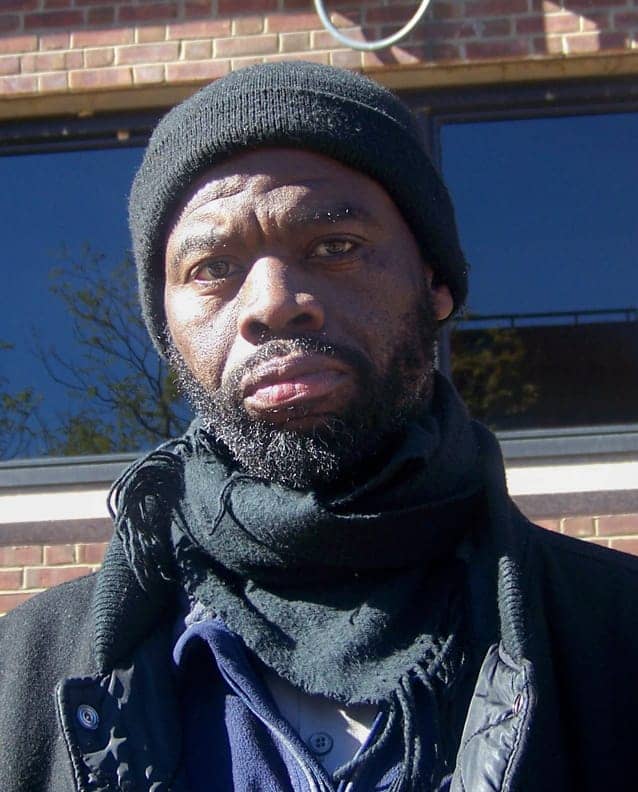
Abu-Jamal was indeed not in the courtroom for Chief Judge Anthony Scirica and Judges Thomas Ambro and Robert Cowan to look him in the face as they considered whether to put him to death. Scirica and Ambro are Reagan appointees, while Cowan was appointed by President William Clinton.
Although the panel upheld the decision vacating his death penalty in 2008, it also denied Abu-Jamal’s motions for a new trial. In May 2009, the U.S. Supreme Court refused to hear an appeal by Abu-Jamal’s attorneys on that part of the panel’s ruling.
The panel rejected three key claims: that trial Judge Albert Sabo, who was overheard afterwards remarking, “Fry the Nigger,” was prejudiced; that the prosecutor was guilty of misconduct for withholding key information from the defense and telling the jury that their decision was not final and would be appealed; and that Abu-Jamal’s constitutional rights were violated when the prosecution barred 10 qualified Black jurors from serving through the use of peremptory challenges.
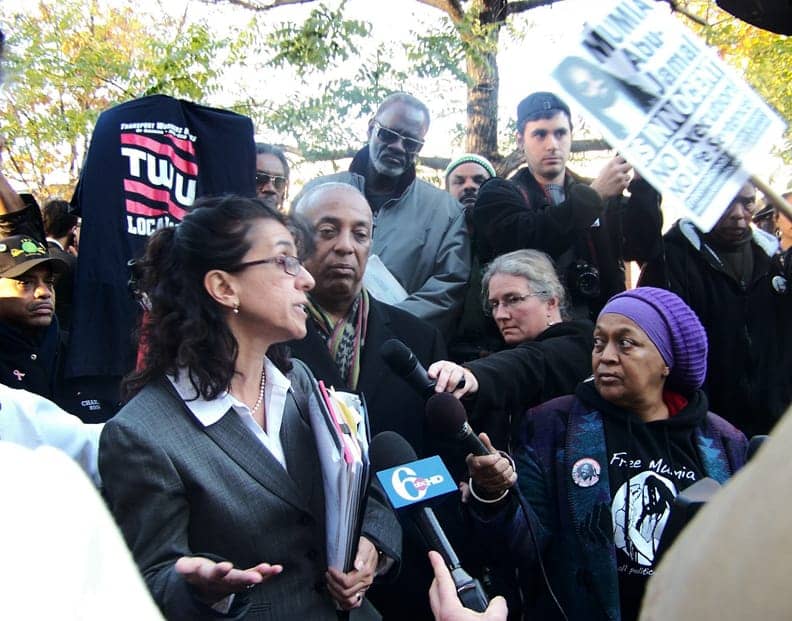
“This flip-flopping on … acceptable language for prosecutors, on the importance of judges being impartial and on other legal precedents all led Amnesty International to conclude in its 2001 report on Abu-Jamal’s case that the state’s highest court improperly invents new standards of procedure ‘to apply it to one case only: that of Mumia Abu-Jamal,’” Lindorff wrote. “Justice, that is to say, has not always been blind in this case. A ‘Mumia Exception’ had been established.”
During the Nov. 9 hearing, the back of the courtroom was packed with Abu-Jamal’s supporters, but court officers allowed Daniel Faulkner’s widow and the relatives of other police officers killed on duty, all but one of them white, to pack the front row seats before even allowing others to enter.
Attorney Judith Ritter presented oral arguments for Abu-Jamal. Her co-counsel, Robert B. Bryan, withdrew several days earlier after an apparent conflict over strategy. Assistant Prosecutor Hugh Burns represented the Commonwealth of Pennsylvania.
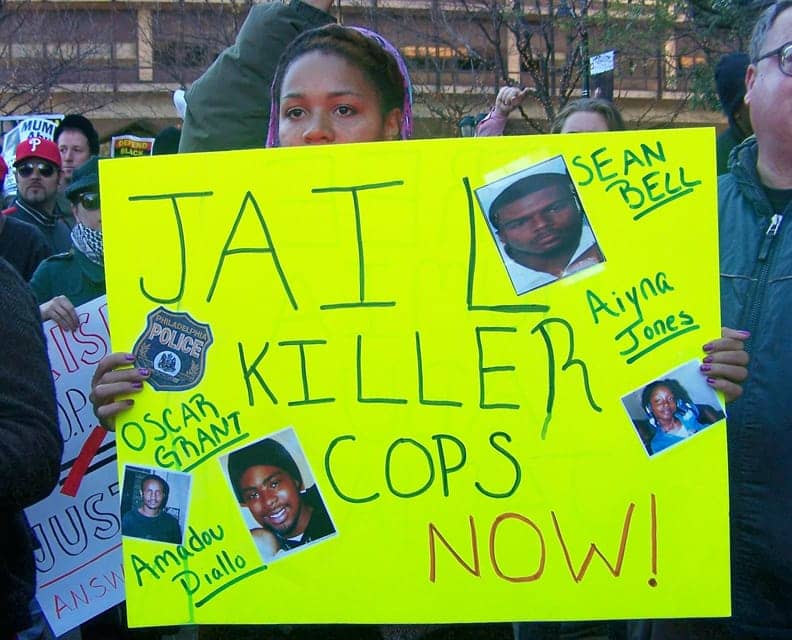
Burns argued that a January 2010 U.S. Supreme Court decision in an Ohio case, Smith v. Spisak, was germane and that the instructions were proper. Ritter contended Spisak did not apply in Abu-Jamal’s case. The justices peppered both sides with challenges to their positions.
Attorney Ritter said afterwards that she felt positive about the panel’s response, that it was simply reviewing its earlier decision from an essentially neutral standpoint.
But Dr. Suzanne Ross, co-chair with Pam Africa of the International Committee to Free Mumia Abu-Jamal, was much more skeptical. She said that the international movement to support Abu-Jamal must be ramped up.

“We see this as an attempt to silence and murder Mumia once and for all,” Ross said. “It’s the same three judges who denied him a new trial. We don’t trust them. We never can say we won when the system is bound and determined to execute one of us.
“We are demanding that U.S. Attorney General Eric Holder review all of the civil rights violations in Mumia’s trial: prosecutorial misconduct, the concealing of potential exculpatory evidence, the judge’s statement to ‘fry the nigger,’ the discrimination in jury selection, and finally the rampant and mass incarceration of Black people in the United States.”

Zadiah Bullard of Newark, New Jersey, added: “Mumia has been in prison all my life. I’m here because the justice system is flawed. President Barack Obama can free Mumia with a stroke of his pen. We have to make him. If he freed Mumia, he could be re-elected. He needs to step out and do something radical for us to make that happen.”
Ross, Johanna Fernandez, filmmaker of the new documentary on Abu-Jamal, “Justice on Trial,” and Professor Michael Schiffman of Germany all raised numerous factual defenses in favor of Abu-Jamal’s innocence during the rally.
Schiffman exposed the now-famous Polakoff photographs, withheld by the police and prosecutors from the defense for years, that challenge the prosecution’s version of the killing of Faulkner and near-killing of Abu-Jamal. Schiffman and others say the photographs show that police moved key evidence at the scene.
They say the photographs also do not show prosecution witness Robert Chobert’s taxi parked behind Faulkner’s car, although Chobert testified he observed Faulkner’s killing from that vantage point.
For more information and to get involved, contact:
- International Family and Friends of Mumia Abu-Jamal at (215) 476-8812
- Philadelphia International Action Center at (215) 724-1618
- Free Mumia Coalition (New York City) at (212) 330-8029, hotline (212) 330-8029, P.O. Box 16, College Station, NY 10030
Websites supporting Mumia Abu-Jamal include:
- http://freemumia.com
- http://abu-jamal-news.com
- http://prisonradio.org/mumia.htm
- http://www.millions4mumia.org
- http://www.MumiaLegalDefense.org
Sign the petition for a civil rights investigation at http://www.petitiononline.com/Mumialaw/petition.html.
Detroit-based journalist Diane Bukowski is the publisher of The Voice of Detroit, was an investigative reporter for the past decade for the Michigan Citizen newspaper, and has been an activist in union and people’s struggles for 40 years. She can be reached at diane_bukowski@hotmail.com.




